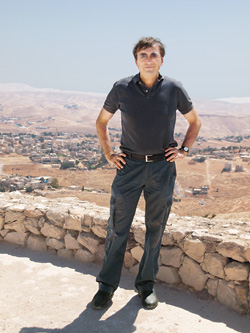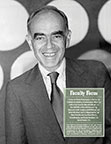Shaping Minds and Morals in Battle
Moshe Halbertal reinforces a code of conduct that allows for principled behavior in wartime.
Printer Friendly Version Many philosophers have grappled with the ethics of war—Mill, Rawls, Kant, and Aristotle among them. But in 2000, Moshe Halbertal, along with lawyers, generals, and other philosophers, worked with a standing army to draft a new Israeli military code of ethics that would test their philosophical ideas in real life-and-death situations. Halbertal’s work didn’t stop once the code was written. Now Gruss Professor of Law at NYU, he spends each spring at Hebrew University of Jerusalem, and on his days off teaches ethics to commanders and lectures to platoons at the Israel Defense Forces Command and Staff College.
Many philosophers have grappled with the ethics of war—Mill, Rawls, Kant, and Aristotle among them. But in 2000, Moshe Halbertal, along with lawyers, generals, and other philosophers, worked with a standing army to draft a new Israeli military code of ethics that would test their philosophical ideas in real life-and-death situations. Halbertal’s work didn’t stop once the code was written. Now Gruss Professor of Law at NYU, he spends each spring at Hebrew University of Jerusalem, and on his days off teaches ethics to commanders and lectures to platoons at the Israel Defense Forces Command and Staff College.
“Professor Halbertal can be philosophical and very practical with two feet on the ground, which is essential, because what he teaches will be put into action tomorrow by our commanders,” says Noam Tibon, IDF commander in charge of the officer training school. “He can deal with any problem in three or four dimensions and is reviewing his views at all times.”
As a small country not at peace with all of its neighbors, Israel has seen much change since 2000. While the capture of soldier Gilad Shalit (2006), the war in Gaza (2008-09), and the raid by Israeli forces on a flotilla of “Gaza freedom” activists (2010), for example, have not forced revisions to the code, they have provided new questions for Halbertal, who is still engaged in making sure the code addresses and accounts for modern realities. By speaking to different groups of soldiers who have been engaged in recent conflicts, Halbertal has learned some of the reasons that the soldiers on the ground have had difficulties applying the code, and even about times the code has failed to translate to the field.
For instance, one of the principles the team of ethicists codified in 2000 stated: “One must do everything possible to minimize the enemy’s civilian casualties. It is not enough to say, ‘I am not intending or did not intend to harm civilians.’ You have to show intention of not harming.” Speaking to those who were charged to fire artillery in the recent Gaza war, Halbertal learned that the way war is currently fought, a target is often not visible to whoever is on the ground. A soldier is given coordinates by central command, which is miles away. In other words, the soldier firing the missile is not in a position to apply the ethical principles in the way the team desired. His or her individual ethical autonomy has to be replaced by “a shared world of trust within the operation because of such heightened divisions of labor,” as Halbertal put it. Thinking through how to create this shared world of trust is one of Halbertal’s newest endeavors.
How the soldiers now think about the capture of their comrade Shalit is another challenge to the application of the code. The principle of proportionality, as modified for this code, states that “if you foresee a collateral harm to enemy civilians (even after doing everything you can to avoid doing so), you have to weigh whether that military achievement is proportional to the death you will cause.” A minor military victory is not enough to justify the collateral death of many civilians. But when the other side thinks capturing one soldier or shooting down one tank can embolden them, especially through the use of propaganda and modern media, the soldiers in the field who are trying to act ethically can lose their bearings and misapply the principle of proportionality. “You can’t be obsessed with how it will look to the other side,” teaches Halbertal. “This was an element that I never understood fully in the nature of this war.”
Soldiers and commanders bring their own battle experiences into the classroom. Halbertal recognizes that war is not an ethics seminar and takes soldiers’ objections to aspects of the code seriously. (“You want me to go through the principles of avoidance, proportionality, etc., when I am under fire?!”) Halbertal’s answer is that soldiers must train and internalize these principles before going to battle so that they become second nature. This ability to act from an absorbed ethical character rather than having to calculate consequences is similar to Aristotle’s concept of phronesis, or practical wisdom.
Commander Tibon believes that allowing even the lowest-level soldiers to be inspired and challenged by one of Israel’s top philosophers keeps them open-minded and reminds them of the importance of their jobs in the army. “Moshe is very smart, and he takes you to a very high point in your thinking,” says Tibon. “It is not two plus two is four. There is no clear-cut right and wrong, and so he has to teach us how to think beyond simplicity.” Such highmindedness, one can hope, might eventually lead to fewer conflicts in the Middle East along Israel’s borders.
—

 Multimedia
Multimedia